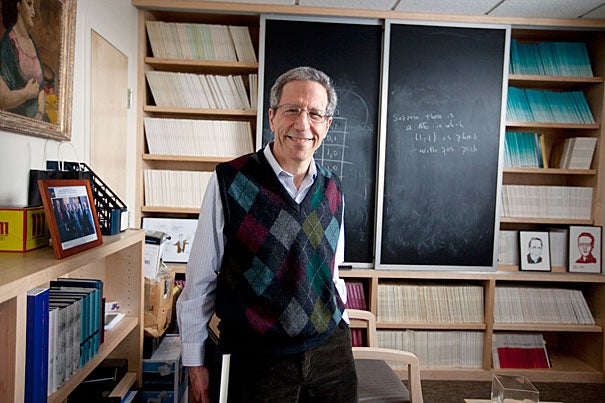
“Being named to the Adams University Professorship is a tremendous honor, for which I feel very grateful,” said Eric S. Maskin, a Nobel laureate, who was named a University Professor, Harvard’s highest honor for a faculty member.
File photo by Rose Lincoln/Harvard Staff Photographer
Maskin named University Professor
An effective teacher and a Nobelist, he spans economics, political science with his work
Eric S. Maskin, a Nobel laureate whose work has had widespread impact on economics and aspects of political science, has been named a University Professor, Harvard’s highest honor for a faculty member.
Maskin, who helped to lay the foundations of mechanism design theory and has made major contributions to game theory, was recognized for groundbreaking scholarship that crosses academic boundaries and for his dedication to teaching.
“An extraordinarily distinguished scholar and educator, Eric Maskin has made contributions across the field of economics, from game theory to intellectual property rights to political economy,” Harvard President Drew Faust said. “As a member of the Harvard faculty, he has distinguished himself not only for his research, but for his outstanding teaching, his skillful mentoring, and his warmth and vitality as a colleague and leader in the University’s intellectual life.”
The University Professorships were established in 1935 to recognize individuals whose work on the frontiers of knowledge cross the traditional boundaries of academic disciplines.
Maskin’s appointment as the Adams University Professor follows the retirement of musicologist Christoph Wolff, who held the chair for 10 years. There are 23 faculty members who hold the title University Professor.
“Being named to the Adams University Professorship is a tremendous honor, for which I feel very grateful,” Maskin said. “My work overlaps with a number of other fields, such as mathematics, government, law, computer science, philosophy, and biology. The new position gives me the wonderful opportunity to teach courses in those areas, probably with faculty from those departments and Schools.”
Raised in New Jersey, Maskin earned his bachelor’s, master’s, and doctoral degrees at Harvard. After a year at the University of Cambridge, he served on the faculty at Massachusetts Institute of Technology for seven years before joining the Harvard faculty in 1985 as a professor of economics. He was named Louis Berkman Professor of Economics in 1997. Starting in 2000, he spent more than a decade at the Institute for Advanced Study in Princeton, N.J., before returning to Harvard in January 2012.
A math concentrator as an undergraduate, Maskin has said that he was drawn to his field almost by accident when on a whim he enrolled in a class on information economics. There, he said, he was enthralled by a discipline that had “the precision, rigor, and sometimes the beauty of pure mathematics, and also addressed problems of real social importance.”
Maskin’s Nobel Prize, awarded in 2007, recognized his work on mechanism design theory, which illuminates the interplay of individual incentives, private information, and social costs and benefits in transactions that affect the optimal performance of institutions. “The theory allows us to distinguish situations in which markets work well from those in which they do not,” the Nobel committee noted. “Today, mechanism design theory plays a central role in many areas of economics and parts of political science.”
In addition, Maskin’s research has helped to shape the field of game theory, and it has produced insights into monopoly price discrimination and decentralized markets. He has published more than 130 articles and working papers on economic theory, has edited three books and a monograph series on the subject, and has served on the editorial boards of numerous economics journals, including The Quarterly Journal of Economics, of which he was editor from 1984 to 1990.
Maskin is also known for his close mentoring of students. He has twice won the Economics Department’s Galbraith Graduate Teaching Prize, and several former students have become close collaborators.
He is past president of the Econometric Society and of the Game Theory Society, an elected fellow of the American Academy of Arts and Sciences, the European Economic Association, and the Society for the Advancement of Economic Theory, and an elected member of the National Academy of Sciences.
Among his many distinctions, Maskin has received the 2007 Kempe Award in Environmental Economics, the 2009 Grande Médaille of the City of Marseille, the 2010 Harvard Centennial Medal, and the 2011 Cristóbal Gabarrón Foundation International Economics Award. He has been recognized with honorary degrees and professorships from institutions in Europe, Asia, and the Americas, has delivered dozens of distinguished lectures and keynote addresses, and has advised the British and Polish governments, the Bank of Italy, and the World Bank on the design of auctions and other issues.




